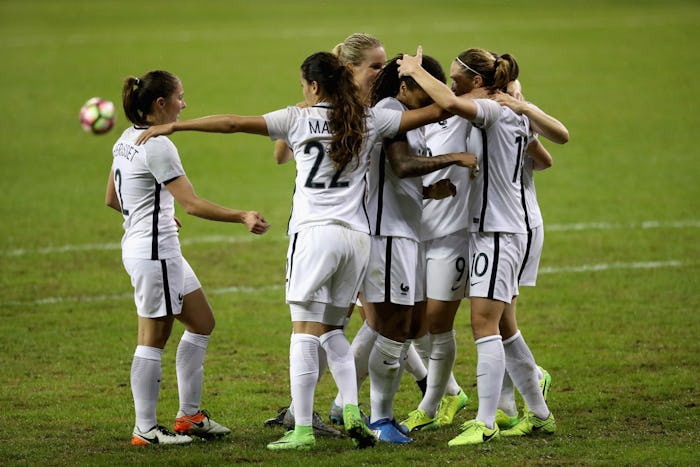News

Women's Soccer Still Isn't Getting Equal Pay, Despite Progress
The U.S. Women's National Team Players Association (USWNTPA) has been trying to bargain with U.S. Soccer for years now for equal pay. Finally, this week, the two organizations struck a deal and although they received some benefits and better contract terms, the U.S. Women's Soccer Team still can't close the wage gap. It's kind of absurd, when you think about it, given that the women's soccer team is very good. They've won numerous championships, while their male counterparts can barely qualify for the World Cup. The women's team is also more popular than the men's team with fans. Still, the USWNTPA can't get equal pay.
Romper's request for comment on the negotiations was not immediately returned by U.S. Soccer officials, though the organization and the USWNTPA released a joint statement on Wednesday saying that they were proud to announce that they ratified "a new collective bargaining agreement which will continue to build the women's program in the U.S, grow the game of soccer worldwide, and improve the professional lives of players on and off the field."
They added, "We are proud of the hard work and commitment to thoughtful dialogue reflected through this process, and look forward to strengthening our partnership moving forward."
It's not a terrible deal. The two organizations renegotiated the base pays and match bonuses and according to The New York Times, some players will double their salaries, making anywhere from $200,000 and $300,000 in a given year. (The men's salaries tend to start out around $400,000 and they receive larger bonuses for winning.) There are new travel perks, like per diems equal to the men's team, better hotels, and increased support for players who are pregnant or adopting.
It's not equal pay, but "equitable" pay, according to the USWNTPA co-captain Becky Sauerbrunn. She told the Planet Fútbol podcast:
We’re trying to figure out where women’s soccer is going, so we may not have the same exact structure as the men. So equal isn’t the right word. It would be equitable, because we are asking for a different structure.
That attitude is reflected in the new agreement. The travel and lifestyle perks may seem trivial, for example, but they were reportedly very important to the players — to not be treated like second class citizens is a big deal. The women were also super involved in the whole process, according to those close to the talks. Saurbrunn and her teammates would huddle over single words in the contract and practice what they were going to say before the meetings, deciding beforehand who was going to say what. They were not messing around.
The women's union director, Becca Roux, who was hired after the USWNTPA fired their former union head Rich Nichols, seemed optimistic about the agreement. She told The New York Times:
We tried to completely change the methodology for how to define our value, and we made progress in that regard, and it changes the equation for the future.
Although they didn't end up with equal pay, which they threatened to strike over last year, it seems like they've achieved something more strategic. Better pay scale lifestyle "enhancements," as the team called them, might not be a total win, but it is progress. And it can only get better at this point.